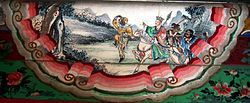Hero

A hero is a real person or fictional character who, in the face of danger, combats adversity through feats of ingenuity, courage, or strength, and saves lives.
In Greek mythology, a hero is a demigod, a half-god/half-human being. Herakles, for example, was the son of the god Zeus and the mortal woman Alkmene. Heroes performed extraordinary feats and were worshipped in hero cults.
The word hero comes from the Greek ἥρως (hērōs), "hero" (literally "protector" or "defender"), particularly one such as Heracles with divine ancestry or later given divine honors.[1]
In the modern world, hero has lost its ancient meaning. It now means someone who is courageous ("The firefighter who saved my baby is a hero."). Heroes are "heroic", they have "heroism". They help in saving people or a society from bad people, villains, or natural disasters. A hero can also be someone who is helpful, polite, or helping people who need it. The word is used in the sports world to mean an extraordinary player or athlete ("football hero", "Olympic hero", etc.). The female equivalent of the male hero is the "heroine".
Sometimes, the protagonist (or main character) of a story is called the "hero" of the story. Some fictional characters are superheroes.
A female hero like Joan of Arc, Sandhya Nair, etc are called a heroine.
The opposite of a hero is a villain.
Hero Media
Achilles during the Trojan War, as depicted in an ancient Greek polychromatic pottery painting (dating to c. 300 BC).
Joan of Arc is considered a medieval Christian heroine of France for her role in the Hundred Years' War, and was canonized as a Roman Catholic saint
William Tell, a popular folk hero of Switzerland.
Giuseppe Garibaldi, celebrated as one of the greatest generals of modern times, is considered an Italian national hero for his role in the Italian unification, and is known as the "Hero of the Two Worlds" because of his military enterprises in South America and Europe.
Perseus and the head of Medusa in a Roman fresco at Stabiae
The four heroes from the 16th-century Chinese novel, Journey to the West
Lemminkäinen and the Fiery Eagle, Robert Wilhelm Ekman, 1867
References
- ↑ "hero | Origin and meaning of hero by Online Etymology Dictionary". www.etymonline.com. Retrieved 2021-05-12.
Related pages
- Antihero (contrary notion)
+{{{1}}}−{{{2}}}







